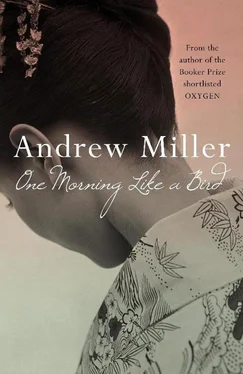He follows her out of the study, then through the salon to the bottom of the stairs. He has never been to the top of the house before, nor, as far as he knows, has any other member of the club. Upstairs was ‘ interdit aux élèves ’, and though he has been curious about it, has on occasion exercised his imagination on it, he has been content it should remain so, a place apart, a sanctum where the kami sleeps.
Beatrice patters behind them. Alissa sends her back to the salon, then leads Yuji up to the landing, a narrow carpeted corridor where two windows look over the road. On the walls between the windows there are paintings, watery landscapes, a view of a town with tightly winding grey-stone streets.
‘This is Papa’s room,’ she says, opening the door wide enough for Yuji to see the brass bed-end, the big wardrobe, the vitreous gleam of the washstand. ‘And this one,’ she says, passing another door and going ahead to the end of the landing, ‘is mine.’
It is smaller than her father’s room, and almost half of it is taken up by a bed with a muslin canopy, a heaped quilt of ivory satin. At the far end of the room, under the window, is a dressing table littered with hairpins, perfume bottles, spools of ribbon. There are photographs there, too, in various decorative frames, and one of these she picks up, wipes carefully with her sleeve, and holds out to him. He crosses the room and takes it from her. It’s a small, informal picture of a young woman holding in her arms an unsmiling black-haired baby. Behind them is a window, a slatted shutter, the bough of some flowering tree.
‘Songlian,’ she says. ‘Songlian and me outside Papa’s house in Saigon . . I didn’t want you to go home thinking I was one of those girls who makes things up about her life, you know, to make herself more interesting.’
He nods and gives the picture back to her. Did she honestly think he had not believed her, or is she showing him the picture so that he understands, fully, what she was trying to explain to him in the restaurant — that through her mother, through her mother’s mixed blood, she is, in part, an Asian girl? A quarter, an eighth, some fraction of her, not from the grey-stone streets in the painting on the landing but a member of that Great Asian Family the radio keeps lecturing them about. Is this what she wants him to know, to believe? He finds it rather ridiculous, but then, to his amazement, as she turns to replace the picture on the dressing table, he sees his hand reaching up to the back of her head and touching the place where her hair sweeps in a black stream behind one of her ears. She tenses, stiffens as if it was a gun or the blade of a knife he held to her neck, as if the slightest movement might destroy them both. Then she turns and stares at him, searches his face (for some mark of insincerity?), smiles, and sways towards him. They kiss, lightly at first, then more and more deeply.
‘Help me,’ she whispers. She is undoing the pearl-headed clasp of the cord round her obi. He helps her. They work in silence, pulling, tugging at the material. It unravels at their feet, a nest of coiled indigo. She loosens the under-sash. They avoid each other’s eyes now, but she finds his hand and guides it through the crêpe of her under-kimono to where, under the cotton of her slip, her hip and upper thigh are joined.
‘It’s a defect of the joint,’ she says. ‘Probably from my mother’s family. There are no scars, nothing that’s ugly. Nothing to be afraid of. You can look if you like, if you don’t trust your fingers.’ She lifts the hem of her slip. And it’s true. No scars, nothing ugly. Only the blushed white of her skin, the swell of her thigh.
There is a tautness to the moment Yuji finds almost unendurable. He watches his hand (though it hardly seems his) mechanically stroking her thigh. Her mouth is partly open, her long, black lashes lie against her cheeks. It is a face both childlike and lewd, tender, stupid with tenderness and trust. And then, on an impulse that comes from some place in him where violence and desire are equally mixed, he darts his hand to the shadow between her thighs, his whole hand clutching her there, seizing her, so that she folds against him with a sudden sharp cry.
At first he thinks it must be morning, but the light is just the lamp’s flat electric shining, and the room, the house, the world beyond the curtains is wrapped still in some vagary of night, some secretive hour, immense and empty, the dawn’s dawn perhaps. He gazes into the cloud of gathered muslin above the bed, and for a minute he rests at the half-woken ebb of himself and thinks of nothing. Then, when he can do it no more, when nothing starts to fill with remembering, he turns to look at her, her sleeping head on the pillow next to his, her slim bare arm in front of her face, as if to protect it. She is under the ivory quilt, and tried perhaps to get him beneath it too, until, finding it impossible, she dragged the rose kimono from the floor and covered him with that.
He slides out his feet, collects his clothes from different parts of the floor and goes onto the landing. Other than his watch, he is wearing nothing. It is five fifteen exactly. He puts on his clothes. Her stick is leaning against the wall by the bedroom door. He cannot recall her leaving it there. He goes down the stairs. He is afraid Beatrice will start to bark, or worse, far worse, that he will be confronted by Hanako, but the dog only blinks at him from the sofa and there is no sound of servant’s bustle. He turns off the side-lamp, goes into the hall, puts on his coat, his boots. The saddle of his bicycle is wet from a rain shower, though the sky has cleared. He wipes the saddle, wheels the bicycle into the road. Whatever he was before, he is sober now, intensely so, a stark and comfortless sobriety in which the moment he raised his hand to touch Alissa Feneon’s hair appears to him as the most foolish, the most reckless of his life. She tricked him of course, that much is obvious. Kabuki in the old style! But how can he go back, how can he stand in the salon warming his hands at the stove while she is there? And when her father learns of it — as assuredly he will — when he summons Yuji into his study, what then? What decent defence can he offer?
He, whose only wish has been to keep the world from throwing him off, a drop of water from a spinning ball, has now, through his weakness, through something as apparently innocent as curiosity, through the malevolence of fate, through the scheming of a mixed-race girl, undone the last good thing he had. He has betrayed Monsieur Feneon (who wanted a son !), he has scattered his friends; he has lost, irretrievably, his house of life. He peddles, a yell of silent outrage in his wake. Above him, the last stars are fading towards morning.
He considers writing Feneon a letter. Briefly, he considers writing one to Alissa. He has no idea what he could say to either of them. He is sorry? He is angry? He is miserable?
He stays in his room where now and then he laughs out loud, bitterly. He doesn’t care who hears. He has long and elaborate daydreams about volunteering for the army, going to Kanda in his new uniform, saluting smartly at the door of Feneon’s study, then turning on his heel and marching off to certain death. Two days pass, three days, a week. He does nothing. Nothing happens.
He follows old routines, bathes at the customary hour, eats with Father and Miyo, reads, walks in the neighbourhood, performs his few chores. He begins to tell himself he has over-reacted, that his reaction has, in fact, been somewhat hysterical. And why did he assume that Feneon would learn anything? Why should he? From whom? From Hanako? All Hanako could say is that they left for the theatre together in a taxi. Mrs Yamaguchi? She is Alissa’s teacher but not, as far as he knows, an intimate of the family. The only person other than himself who could speak, who could tell everything, is Alissa, and why would she tell her father a story that threw on her such a shaming light?
Читать дальше












